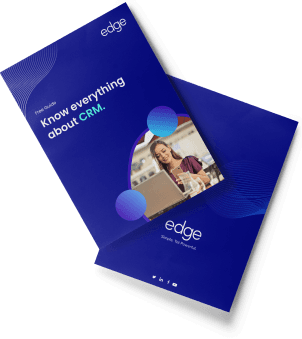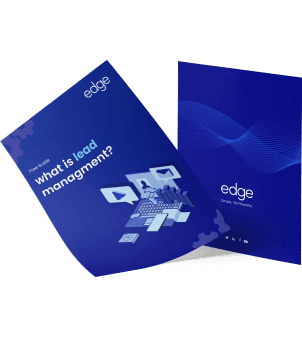Table of Content
1. The Crucial Role of Trust in B2B Customer Relationship Management
2. Understand Customer Relationship Management in B2B: Characteristics, Importance of Long-Term Partnerships, and Challenges
3. The Benefits of B2B CRM Integration and Best Practices
4. The Power-Packed Components of CRM and Seamless Integration for Growth
5. How To Do B2B CRM Implementation Successfully
6. B2B CRM Best Practices
7. Conclusion
1. The Crucial Role of Trust in B2B Customer Relationship Management
Business to Business marketing is the direct give the right value for your product with benefits and suitability of products and, moreover, the direct services for industries and organizations. Establishing trust in Customer Relationship Management in B2B is the main focus point of any good business. Getting trust and reputation in business is the key to understanding the market and trends.
Developing a Trustable customer relationship assists you in gaining a deeper understanding and knowledge of the market. For creating from zero, the right CRM Tools guide you in the right way to success in business.
CRM is key in B2B relationships by centralizing customer data, offering a 360-degree view of clients, and enabling enhanced communication. This fosters better understanding, personalized solutions, and improved customer satisfaction, leading to stronger and more profitable relationships.
2. Understand Customer Relationship Management in B2B
B2B Customer Relationship Management (CRM) refers to a company's strategy, procedures, and technology for managing and nurturing relationships with other companies. Unlike B2C CRM, which focuses on individual consumers, B2B CRM targets corporations as clients. Its distinguishing features include dealing with longer, more complex sales cycles, more stakeholders, and a focus on long-term relationships rather than one-time purchases.
In the B2B sector, building long-term partnerships and trust is critical. Since the sales cycles are more extended, establishing strong relationships is essential to maintain loyalty and repeat business. Trust is crucial in B2B CRM as it involves substantial investments, and businesses often rely on each other for mutual success.
Managing customer relationships in the B2B context comes with complexities and challenges. The decision-making process involves multiple stakeholders, each with unique needs and priorities. This requires tailored communication and personalized approaches. Additionally, addressing the specific demands of each client can be resource-intensive, making it vital to balance efforts and allocate resources effectively.
Furthermore, B2B Customer relationships often extend beyond a single point of contact, and maintaining consistent communication across various touchpoints can be challenging. Moreover, changes in the organization's structure or personnel shifts can impact the relationship, necessitating adaptability, and resilience in managing B2B CRM effectively.
3. The Benefits of B2B CRM Integration and Best Practices
Customer Relationship Management (CRM) has become an indispensable tool CRM tool for B2B Integration, revolutionizing the way they manage client relationships and boosting overall efficiency. By streamlining and centralizing customer data, CRM provides a holistic view of B2B clients, enabling businesses to better understand their needs and preferences.
B2B CRM solutions offer seamless CRM integration with various systems, such as sales, marketing, and customer support, consolidating data from multiple sources into a single database. This CRM integration ensures that relevant information is readily accessible to teams, allowing for a more coordinated approach to customer interactions.
One of the primary B2B CRM Benefits is its impact on lead management and conversion rates. B2B CRM Integration systems enable businesses to track leads from initial contact to conversion, allowing sales teams to prioritize and nurture prospects effectively. Automated lead scoring and nurturing functionalities within CRM tools help identify high-potential leads and guide them through the sales funnel, ultimately boosting conversion rates.
Effective communication is crucial in B2B CRM Integration, where complex sales cycles involve multiple decision-makers and touchpoints. CRM facilitates communication and collaboration across these touchpoints by providing a centralized platform for teams to share notes, tasks, and updates. This enhances internal alignment and ensures that the right information reaches the right people at the right time, fostering smoother client interactions.
Implementing a B2B CRM strategy involves adopting the best CRM practices tailored to the organization's needs. By utilizing the right B2B CRM tools for who, companies can optimize their processes, improve customer engagement, and streamline workflows. Additionally, leveraging B2B CRM analytics allows businesses to gain insights into customer behavior, identify trends, and make data-driven decisions, further enhancing their ability to nurture strong and profitable relationships.
4. The Power-Packed Components of CRM and Seamless Integration for Growth
Customer Relationship Management in B2B environments encompasses several essential features and functionalities tailored to meet the unique needs of businesses engaging in B2B interactions.
- Lead Management:
B2B CRM systems excel at lead management, enabling businesses to capture, track, and nurture leads throughout the sales cycle. Lead scoring and segmentation functionalities help prioritize high-value prospects and align marketing efforts effectively.
- Contact and Account Management:
B2B CRM centralizes customer data, including contact information, interactions, and historical data, providing a comprehensive view of accounts and facilitating personalized communications and relationship-building.
- Sales Pipeline Tracking:
B2B CRM allows sales teams to visualize and manage their pipelines efficiently. With real-time updates on opportunities and deals, businesses can identify potential bottlenecks and optimize sales processes.
- Collaboration Tools:
CRM systems foster collaboration by allowing multiple team members to access and share customer data, notes, and communications. This promotes seamless coordination among different departments, enhancing customer experiences.
- Marketing Automation Integration:
Integrating CRM with marketing automation tools streamlines marketing efforts, allowing for targeted campaigns, lead nurturing, and better alignment between marketing and sales teams.
- ERP Integration:
Integrating CRM with Enterprise Resource Planning (ERP) systems enable smoother data flow between sales, customer support, and accounting, improving order management and customer service processes.
- Data Analytics and Reporting:
B2B CRM platforms offer robust data analytics and reporting features. Businesses gain valuable insights to make data-driven decisions and fine-tune their strategies by analyzing customer interactions, buying patterns, and sales performance.
- Customer Support and Ticketing:
B2B CRM systems often include customer support and ticketing features to efficiently manage and resolve customer inquiries and issues, ensuring a seamless customer experience.
- Mobile Accessibility:
With the increasing prevalence of remote work and on-the-go sales teams, B2B CRM platforms offer mobile accessibility, enabling users to access critical customer information and updates anywhere.
- Customization and Scalability:
B2B CRM solutions can be tailored to fit the organization's specific needs and are scalable to accommodate business growth and changing requirements over time.
Incorporating CRM into a broader ecosystem of business tools is crucial for a seamless workflow. Integration with marketing automation tools ensures leads move seamlessly from marketing efforts to the sales pipeline. Similarly, CRM integration with ERP systems allows for a unified view of customer interactions and financial data, enhancing order processing and invoicing.
Data analytics and reporting are pivotal in B2B CRM, as they empower businesses to analyze customer behavior, identify trends, and forecast sales opportunities. Leveraging these insights facilitates effective sales and marketing strategies, ultimately driving business growth and success.
5. How To Do B2B CRM Implementation Successfully
B2B CRM Implementation is crucial for organizations seeking to excel in today's competitive market. The process starts with a thorough evaluation of the organization's particular CRM objectives and goals, followed by a strategic strategy describing the implementation roadmap, resource allocation, and important milestones.
Selecting the right B2B CRM solution that aligns with the organization's requirements and growth prospects. Equally important is ensuring that the CRM strategy is aligned with overall business objectives, supporting sales and marketing goals, enhancing customer service, and optimizing lead management.
Seamless integration with existing systems, such as marketing automation and ERP, facilitates a unified view of customer interactions and data flow across different departments. During implementation, user training is essential to empower employees with the knowledge and skills to use the CRM effectively. At the same time, a structured change management approach addresses resistance and facilitates a smooth transition.
Rigorous testing and quality assurance ensure a glitch-free rollout and continuous monitoring and improvement help maximize CRM effectiveness. Encouraging user adoption and support fosters a culture of CRM utilization and contributes to long-term success in building strong B2B customer relationships and driving overall business growth.
6. B2B CRM Best Practices
B2B Customer Relationship Management (CRM) drives business growth and enhances customer experiences. To maximize the value of B2B CRM investments, organizations should adopt actionable tips that lead to successful implementation and utilization.
- Comprehensive Training:
Train all users on CRM functionalities, emphasizing how it aligns with their roles and responsibilities. Ensure they understand the benefits of B2B CRM and how it enhances their daily workflows. Well-trained users are more likely to adopt the system effectively, leading to improved data accuracy and better customer interactions.
- Data Quality and Segmentation:
To avoid inaccuracies and duplicates, focus on data quality. Implement a robust data governance strategy to maintain accurate and up-to-date customer information. Effective data segmentation based on factors like industry, company size, or location allows for targeted marketing and personalized communication, strengthening B2B relationships.
- Lead Scoring and Nurturing:
Develop a lead scoring system that ranks prospects based on their engagement and buying potential. Prioritise high-scoring leads for personalized nurturing through tailored content and automated follow-ups, ultimately increasing conversion rates.
- Integration with Business Tools:
Integrate B2B CRM with other essential business tools like marketing automation and ERP systems. Seamless data flow and centralized information enable cross-departmental collaboration and provide a holistic view of customer interactions.
- Analytics and Reporting:
Utilise CRM analytics to gain insights into customer behavior, sales performance, and marketing effectiveness. Analyzing data helps identify trends, optimize strategies, and make data-driven decisions for better business outcomes.
- Personalization and Customization:
Tailor customer interactions and communications based on their preferences and previous engagements. Personalized content, product recommendations, and customized offers demonstrate a deeper understanding of B2B clients' needs, fostering trust and loyalty.
- Continuous Improvement:
Regularly review CRM processes and workflows to identify areas for improvement. Collect feedback from users and customers to address pain points and enhance CRM functionality, ensuring its relevance and effectiveness over time.
By implementing these best practices, businesses can unlock the full potential of B2B CRM. A well-trained workforce, accurate customer data segmentation, and personalized experiences build strong and profitable relationships, driving customer satisfaction and sustainable growth in the competitive B2B market.
7. Conclusion
CRM emerges as the key to unlocking a treasure trove of benefits for unrivaled business success. By streamlining and centralizing customer data, CRM provides a panoramic view of B2B clients, empowering organizations to delve deeper into their needs and preferences.
But hold on, the significance of CRM goes way beyond data management. Brace yourself for the real deal – it directly impacts business growth, customer retention, and revenue generation in the B2B sector. Prepare for a sales process like never before, as CRM drives the charge with effective lead management, personalized nurturing, and seamless communication, resulting in soaring conversion rates and revenue growth. And that's just the beginning!
Personalized interactions and targeted marketing campaigns are the secret sauce to fostering unbreakable bonds with your customers. Say hello to higher customer retention rates and an army of fiercely loyal clients.
But here's the real deal – to fully harness the phenomenal power of B2B CRM, you've got to dive headfirst into proactive action. Ready yourself for a transformational journey by implementing or optimizing your CRM strategies. Set crystal-clear objectives aligned with your business goals, cherry-pick the perfect CRM solution, and weave it seamlessly into your existing systems for a unified view of customer interactions.
Strap yourself in for comprehensive training, data quality management, and the magic of regular analytics and reporting. This wizardry will amplify your CRM effectiveness and decision-making capabilities, elevating your business to new heights.
With these proactive measures in place, brace yourself for mind-blowing results. Unlock the full potential of B2B CRM, and watch as lasting customer relationships bloom and sustainable growth takes flight. Embrace CRM as your strategic weapon to revolutionize customer experiences and pave the way for long-term success in the fiercely competitive B2B arena.
Ready to take the plunge? Dive into our comprehensive guide on "B2B CRM Best Practices" and arm yourself with actionable tips and strategies to supercharge your CRM investments.
But wait, we want to hear from you! Share your B2B CRM experiences or dazzling insights in the comments section below. Trust us, collaboration and shared knowledge are the keys to conquering the B2B realm like never before.
Hold on, there's even more in store! Jump into our treasure trove of articles showcasing B2B CRM success stories, integration best practices, and the power of data-driven decision-making. You can find these insightful reads at https://www.edgecrm.app/articles/.
Ready to take your company to soaring heights? Equip yourself with our game-changing CRM software, "edge CRM." It's the ultimate arsenal to supercharge growth, elevate client retention, and generate jaw-dropping revenue. Don't miss this chance to revolutionize your business with edge CRM. Your path to remarkable success awaits!
Now's your time to shine! Don't miss this extraordinary opportunity to revolutionize your B2B customer relationships. Dive into the world of CRM, implement or optimize your strategy, and let's take your customer experiences to soaring heights of success. Together, we'll create remarkable results that will leave a lasting impact in the world of B2B brilliance!













